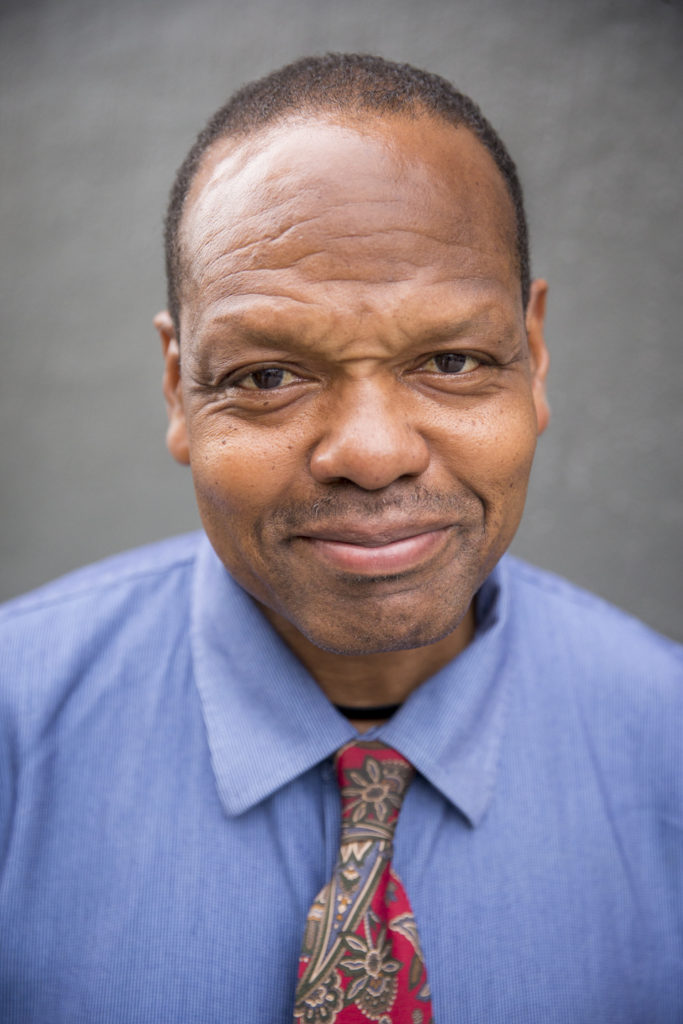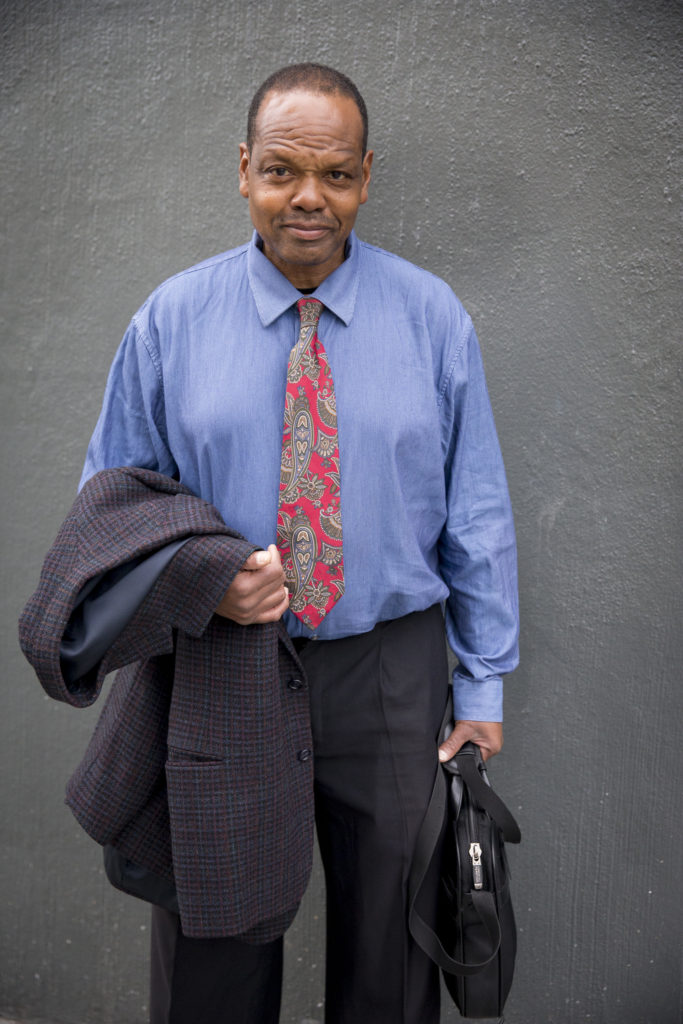
I grew up in Columbus, Ohio. The first part of my life was pretty violent. My dad was an alcoholic drug dealer and he was a very violent man, but the second part was pretty cool. Me and my stepdad spent a lot of time working on getting and feeling better, but I was already traumatized. My stepdad had a hard time with me, because I never told anyone about my trauma, and I had a lot of trauma in my early years of life.
My real father took me to the bars at a very young age. The difference with my stepdad was an alcoholic but he was a fun alcoholic, and he went to work everyday. I learned some good work ethics from him. We owned a fish market, and I used to work there with my dad, and then at my dad’s apartment complex—I was a pretty hard working kid.
I went to Catholic schools, and I played sports. Football was my favorite, but I was best at track. I ran the hurdles. I had three sisters and I was the oldest, the only boy, so my childhood was mixed.
I went to the military after high school. And there was more trauma. In the military, it was a very violent environment. I didn’t make it very long there. They knew that there was something going on with me, but I never saw a psych or anything. I was stationed in Jackson, South Carolina. I was supposed to go to Germany. Thank God I didn’t. I would be in the fields shooting opium and they would shoot me. The main reason I joined the military was because my best friend was getting beat up by his dad. So we said, we either kill him or get into the military. We got into the military. It definitely triggered my PTSD.
Eventually, I ended up as an alcoholic on the streets of San Francisco for many years. I was selling the Street Sheet in the Tenderloin. I was 25 years old and homeless.
Besides the Street Sheet, I also was a street vendor. I would buy stuff and sell it at 8th and market, and I faced a lot of police harassment. I wanted to make a black corner, because we—black people—didn’t have any place to sell, and I thought it could be something positive we could do. But it went bad real fast: People started drinking and using the bathroom on the corner, so I left and stopped doing that.
I used to watch people’s cars in front of the Main Library. I would tell people, “Hey, I’m homeless. Those are my blankets over there. I’ll watch your car.” And I got tips that way. I had a little creative mind and my job that way.
Before, there was a law that said if you did a serious crime three times you would be put in prison for twenty fives years to life. I was facing the third strike and I never committed a violent crime. One was for breaking into my own house! One was for possession of drugs. They gave me four years for 1/100 gram of the meth. If I hadn’t taken that deal, they would have given me a much longer sentence. I couldn’t afford an attorney, of course.
When I was incarcerated, I started learning how to make alcohol in jails. I was drinking more and doing drugs. My alcoholism got to the point where I became a street alcoholic—just homeless and wandering around and I’d be put in jail. I stopped drinking because I didn’t want to go to jail anymore. I knew if I quit drinking, I wouldn’t go to jail.
I met my first wife in the Tenderloin. She was a very interesting woman. She was a hippie with a PhD, but she passed away. I got married right down the street in the Tenderloin and I stayed married for five years, and, for those five years, I stayed sober. I was even a youth director at the YMCA, and I could really tell when a child was traumatized, because I know what it is like. I also was a part of Alcoholics Anonymous and continued to do that for many years, but I relapsed again and was back on the streets when she started getting really, really sick and died.
After that, I got sober again. I went to a veterans program, and I was in school at the same time to be a certified community health worker at City College. I had no clue that I could go to the VA and receive benefits—and then I learned I had benefits at the VA. A guy took me to the VA and he said I had benefits coming.
I became a benefits counselor for veterans—I would drive around and take them to their appointments with American Veterans. They fought for me to have an office at the VA Hospital! I worked for them for three years, and I also got married again. That was a huge mistake. Her mother and my mother told me not to marry her, and I did it anyway.
Then, I started working for the government, and I didn’t like the way that I was treated nor my clients. Obama signed this program, which was about formerly homeless veterans helping currently homeless veterans get a job. I didn’t even have an office; I’d meet my clients in coffee shops or wherever. The thing that got to me was that they were only interested in getting the veteran a job—they didn’t care about their issues. It was just about filling the quota, and I couldn’t do that. I’ll never do that again.

My mentor died; he was an attorney and he was my best friend and a brother to me. I loved Gary dearly and he was a recovering alcoholic, too. And then my sponsor from AA died within a two-month period, my mother called and said she was diagnosed with cancer, and I got a divorce—and she took everything. It was overwhelming with everything happening at once. So I started drinking and using drugs again. Everyone that comes into my life is just gone. I get close to them, and they either die or leave.
I moved to Fremont, and I meant a new mentor, who knew about harm reduction. I met his wife first. I was outside panhandling and she found out that I was a veteran. She and her husband were veterans, too. They took me to their house, and they didn’t even know me, and they said you can stay here as long as you want. Here’s the key. I even became a godfather to his son, and I fell in love with his two black labs.
I went from there to Treasure Island, and the VA gave me housing over there. It was a trip, because my ex-wife works for their administration and suddenly they denied me housing because I wasn’t going to PTSD groups. That’s not a reason to deny someone for housing—it’s a reason for them to give someone housing. So they switched my housing to a place in the Mission. There’s a rooftop bar on top of it—El Techo—but alcohol doesn’t affect me that way anymore.
I don’t win every battle, but I try.
I sell the Street Sheet because I love people. I love interacting with people. I’m a community health worker, so often I talk to people. I want to hone my skills, because I want to run a transitional home for people. I also want to get another social services degree. I got more hands-on experience than a lot of social workers, but in City College I also learned de-escalation tactics, how to deal with people with mental disabilities like myself. I always sat in front of the classroom and I really studied hard. I put 100% in selling the Street Sheet, because I believe you should do the best you can in everything you do. I treat it as a job, because it is a job. I give information to people, because it’s important that people understand what homeless people go through on a daily basis. Selling the Street Sheet, I feel valuable to others.
One thing: A lot of people didn’t choose to be homeless. I still have high hopes for myself. When I became homeless, I still had those hopes. I wish they would know that homeless people are hard workers.
You can find Rodney selling the Street Sheet near the Walgreens on Geary and 42nd Avenue.

